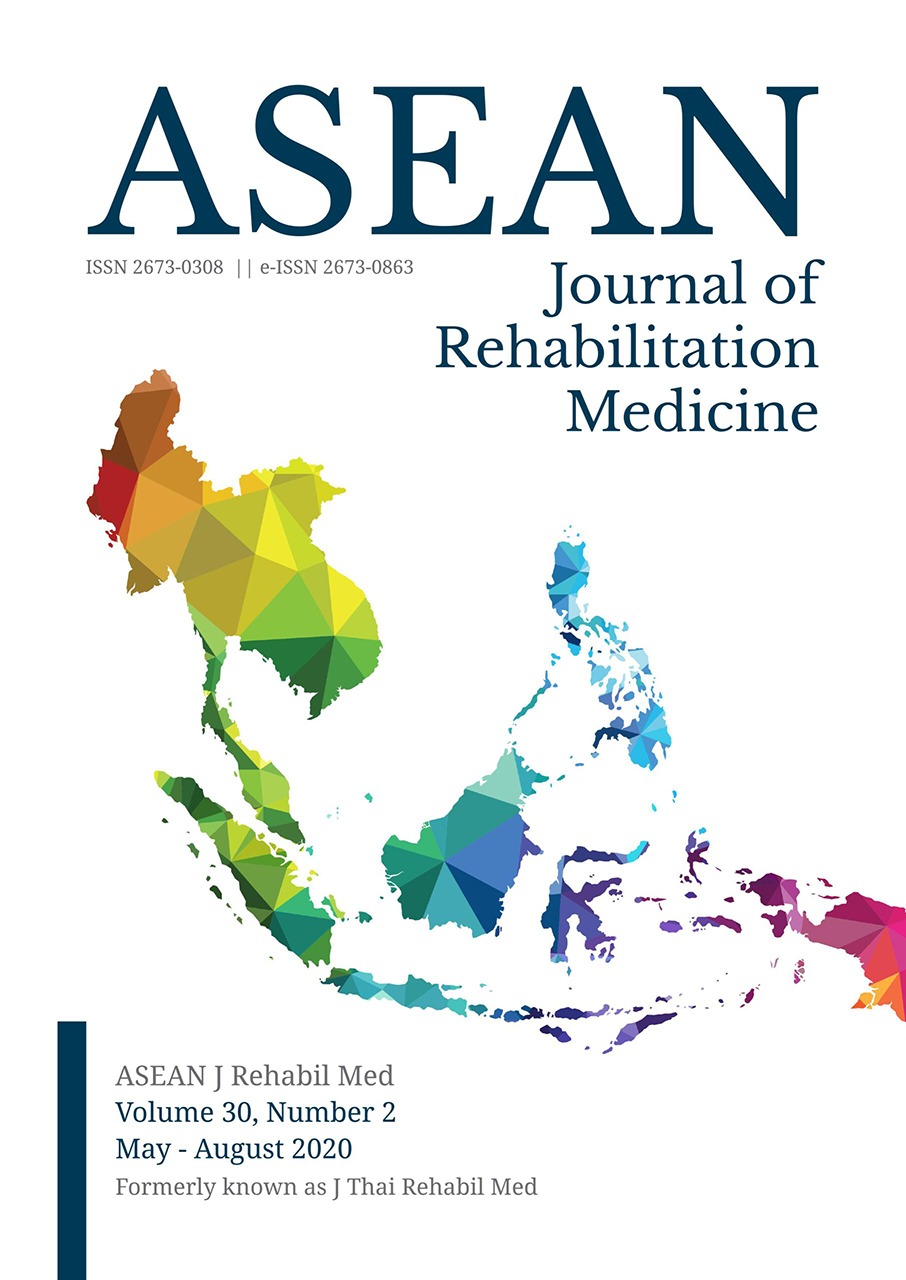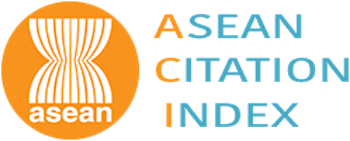Effects of Applications on Computer Tablet for Cognitive Training in Stroke Patients
Keywords:
cognition, perception, computer tablet, stroke rehabilitation, occupational therapyAbstract
Objectives: To study the effects of a computer tablet applications for cognitive training on cognitive functions in stroke patients.
Study design: A quasi-experimental, one group, pretest-posttest design.
Setting: Occupational Therapy Unit of Thammasat University Hospital
Subjects: Fifteen patients with first stroke and cognitive impairment, aged between 35-70 years, and duration of stroke less than a year, who received occupational therapy service from December 2018 to June 2019
Methods: Participants were selected by purposive sampling. The mini-mental state examination (MMSE)-Thai 2002 was used to screen for cognitive impairments. Participants received a tablet computer-based cognitive training under supervision of an occupational therapist 3 times per week for 6 consecutive weeks. They underwent the Digit Span Test, the Thai Cognitive-Perceptual Test (Thai-CPT) and the Dynamic Loewenstein Occupational Therapy Cognitive Assessment (DLOTCA) before and after the training period. Descriptive statistics and non-parametric Wilcoxon
Signed Ranks Test were used to analyze data.
Results: The average age (SD) of the participants was 58 (11.39) year old. The male:female ratio was 1.1:1. The improvement of attention, memory and executive functions reached statistical significance (p < 0.05).
Conclusion: The tablet applications for cognitive training which were used in this study improved attention, memory and executive functions in stroke patients.
References
World Health Organization [Internet]. Cardiovascular diseases (CVDs) [cited 2019 October 23]. Available from: https://www.who.int/news-room/fact-sheets/detail/cardiovascular-diseases-(cvds)
Division of Non-Communicable Diseases [Internet]. Number and mortality rate of non-communicable diseases in Thailand 2016 - 2018 [cited 2019 October 23]. Available from:http://www.thaincd. com/2016/mission/documentsdetail.php?id=13653&tid= 32&gid=1-020
Feigin VL, Norrving B, Mensah GA. Global burden of stroke. Circ Res. 2017;120:439-48.
Banyamak T. Occupational Therapy in Stroke Patients. In: Chinchai P, editor. Occupational therapy for person with neurological conditions. 4th ed. Chiang Mai: Faculty of Associated Medical Sciences, Chiang Mai University; 2017. p. 177-86.
Sun JH, Tan L, Yu JT. Post-stroke cognitive impairment: epidemiology, mechanisms and management. Ann Transl Med. 2014;2(8): 80. doi: 10.3978/j.issn.2305-5839.2014.08.05.
Renjen PN, Gauba C, Chaudhari D. Cognitive Impairment After Stroke. Cureus. 2015;7(9):e335. doi:10.7759/cureus.335.
Thiengburanathum P, Watcharasaksilp K. Dementia among patients with stroke in Maharaj Nakorn Chiang Mai Hospital: prevalence and its associating factor. J Thai Stroke Soc. 2018; 17: 21-30.
Munkhetvit P. Intervention for cognitive impairment. In Munkhetvit P, editor. Occupational therapy interventions for person with cognitive-perceptual dysfunction. Chiang Mai: Darawan printing; 2008. p. 125-49.
Ge S, Zhu Z, Wu B, McConnell ES. Technology-based cognitive training and rehabilitation interventions for individuals with mild cognitive impairment: a systematic review. BMC Geriatr. 2018; 18(1):213. doi:10.1186/s12877-018-0893-1.
van de Ven RM, Murre JMJ, Veltman DJ, Schmand BA. Computer-based cognitive training for executive functions after stroke: A systematic review. Front Hum Neurosci. 2016;10:150. https://doi.org/10.3389/fnhum.2016.00150
Johansson B, Tornmalm M. Working memory training for patients with acquired brain injury: effects in daily life. Scan J Occup Ther. 2012;19:176-83.
Yoo C, Yong MH, Chung J, Yang Y. Effect of computerized cognitive rehabilitation program on cognitive function and activities of living in stroke patients. J Phys Ther Sci. 2015;27:2487-89.
Chen K, Lou VWQ, Lo SSC. A tablet-based volunteer-mediated
intervention for cognitively impaired older people: a pretest-posttest. Res Soc Work Pract. 2020;30:288-97.
Munkhetvit P, Sungkarat S, Lerttrakarnnon P, Pratoomtan D, Thaivon T, editors. Development of application on tablet for cognitive training in stroke patients and study of immediately and long-term effects on cognitive function. Study report. Chiang Mai: The Faculty of Associated Medical Sciences, Chiang Mai University, through 2018 annual research funds; 2020. Sponsored by the Faculty of Associated Medical Sciences, Chiang Mai University.
Institute of Geriatric Medicine, Department of Medical Service. Clinical screening and evaluation guideline for geriatric. Bangkok: WVO Officer of Printing Mill. 2015.
Khanthee P, Dhippayom JP, Munkhetvit P. Effects of cognitive training program on cognitive abilities in stroke patients. J Assoc Med Sci. 2016;49:298-306.
Muangpaisan W. Dementia screening in the community. In: Muangpaisan W, editor. Dementia: prevention, assessment and care. Bangkok: Parbpim. 2013. p. 25-33.
Munkhetvit P, Sriphetcharawut S, Chaolom S, Srikhamjak T. Thai cognitive-perceptual test: Chiang Mai version, study report.
Bangkok: Office of the Higher Education Commission and Otto Bock South East Asia. 2007.
Katz N, Erez ABH, Livni L, Averbuch S. Dynamic Lowenstein
occupational therapy cognitive assessment evaluation of potential to change in cognitive performance. Am J Occup Ther. 2012;66: 207-14.
Zucchella C, Capone A, Codella V, Vecchione C, Buccino G, Sandrini G, et al. Assessing and restoring cognitive functions early after stroke. Funct Neurol. 2014;29:255-62.
Westerberg H, Jacobaeus H, Hirvikoski T, Clevberger P, Ostensson ML, Bartfai A, Klingberg T. Computerized working memory training after stroke - a pilot study. Brain Inj. 2007;21:21-9.
Prokopenko SV, Mozheyko EY, Petrova MM, Koryagina TD,
Kaskaeva DS, Chernykh TV, et al. Correction of post-stroke cognitive impairments using computer programs. J Neurol Sci. 2013;325:148-53.
Barrett N, Swain I, Gatzidis C, Mecheraoui C. The use and effect of video game design theory in the creation of game-based systems for upper limb stroke rehabilitation. J Rehabil Assist Technol Eng. 2016;3:1-6.
Poulin V, Korner-Bitensky N, Dawson DR, Bherer L. Efficacy of executive function interventions after stroke: a systematic review. Top Stroke Rehabil. 2012;19:158-71.
Lin ZC, Tao J, Gao YL, Yin DZ, Chen AZ, Chen LD. Analysis of central mechanism of cognitive training on cognitive impairment after stroke: resting-state functional magnetic resonance imaging study. J Int Med Res. 2014;42:659-68.
Yang S, Jiang C, Ye H, Tao J, Huang J, Gao Y, et al. Effect of integrated cognitive therapy on hippocampal functional connec-tivity patterns in stroke patients with cognitive dysfunction: a resting-state FMRI study. Evid Based Complement Alternat Med. 2014;2014:962304. doi:10.1155/2014/ 962304.
Yeh TT, Chang KC, Wu CY, Lee YY, Chena PY, Hung JW. Effects and mechanism of the HECT study (hybrid exercise-cognitive trainings) in mild ischemic stroke with cognitive decline: fMRI for brain plasticity, biomarker and behavioral analysis. Contemp Clin Trials Commun. 2018;9:164-71.
Zhang H, Wang Z, Wang J, Lyu X, Wang X, Liu Y, Zeng X, et al. Computerized multi-domain cognitive training reduces brain atrophy in patients with amnestic mild cognitive impairment. Transl Psychiatry. 2019;9:48. doi: 10.1038/s41398-019-0385-x.
Chaiwong P, Rattakorn P, Mumkhetvit P. Effects of cognitive training program on cognitive abilities and quality of life in elderly with suspected dementia. Bull Chiang Mai Assoc Med Sci 2015; 48:182-91.
Bastin C, Linden MV, Charnallet A, Denby C, Montaldi D, Roberts N, et al. Dissociation between recall and recognition memory performance in an amnesic patient with hippocampal damage following carbon monoxide poisoning. Neurocase. 2004;10:330-44.






